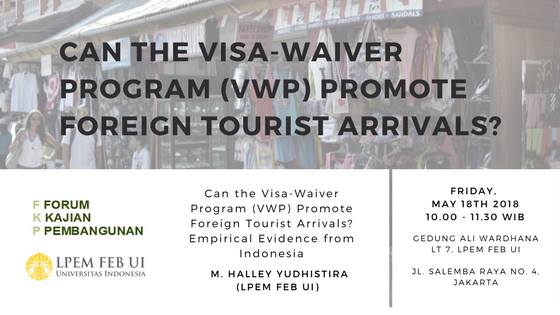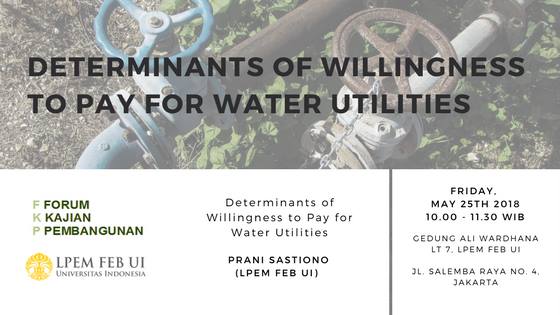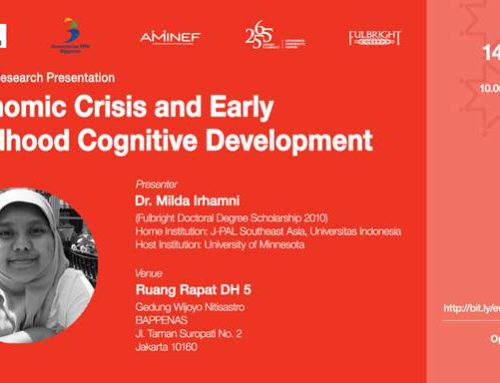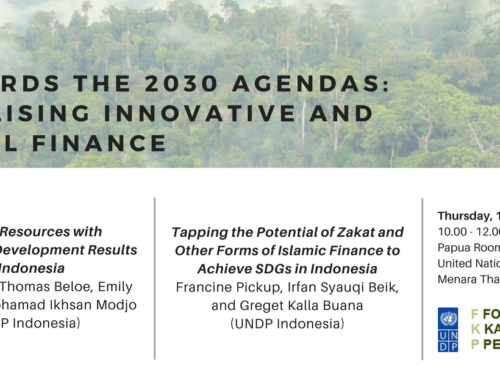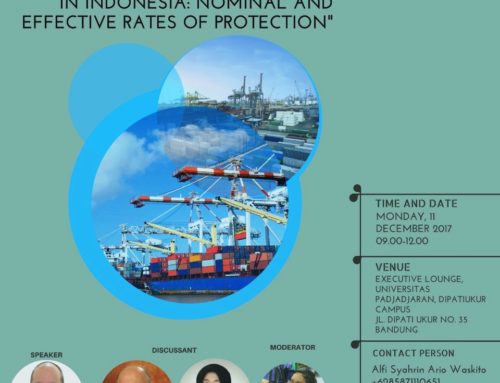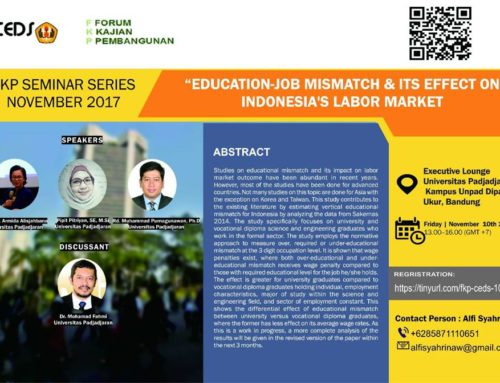In May 2018, the FKP will be hosted by Lembaga Demografi (LD) and Lembaga Penyelidian Ekonomi dan Masyarakat (LPEM), Faculty of Economics and Business, Universitas Indonesia. There will be seven events, detailed below. Registration is needed so the host can prepare for the number of people attending; registration links are given below.
The 12th Sadli Lecture
Jointly organised by LPEM FEB UI and ANU Indonesia Project
Wednesday, 2 May 2018, 08.30 – 14.00 WIB
Grand on Thamrin 1 Room, Hotel Pullman Thamrin, Jl. MH Thamrin No 5, Jakarta
Value chain connectivity in Indonesia: the evolution of unbundlings Professor Fukunari Kimura (Keio University, Tokyo and ERIA, Jakarta)
Abstract: The Lecture will focus on application of the conceptual framework of “unbundlings” proposed by Richard Baldwin (2016) for the Indonesian economy and assesses the value chain connectivity in Indonesia. Indonesia is a geographically large country, and three different levels of unbundlings co-exist within the country: the first unbundling that goes with industry-wise international division of labor in plantation agriculture, mining, and labor-intensive industries, the second unbundling where task-wise international division of labor dominates in machinery industries, and the third unbundling in which face-to-face costs are reduced in the digital economy. In the Lecture, Professor Kimura will argue that the further upgrading of unbundlings, and the more effective utilization of feedbacks among different levels of unbundlings, will enable Indonesia to achieve rapid and equitable economic development. The Lecture is based on a paper prepared with Lurong Chen (ERIA). Discussants: TM Zakir Machmud (FEB UI) and Yos Adiguna Ginting (ISD).
Registration https://2018sadlilecture.eventbrite.com
—
Tuesday, 8 May 2018, 10.00 – 11.30 WIB
Gedung Ali Wardhana Lt 7, LPEM FEB UI, Jl. Salemba Raya No. 4, Jakarta
The expansion of Chinese FDI and Chinese firms in Indonesia
Pierre van der Eng (College of Business and Economics, The Australian National University)
Abstract: Available data on the flows and stocks of Chinese foreign direct invesment (FDI) in Indonesia suggest that they have increased significantly since 2004. Further analysis indicates that these data give an incomplete impression of the activities of Chinese firms in Indonesia. The paper substantiates this by analysing other quantitative data, as well as cases of Chinese investment. It also discusses four specific characteristics of Chinese investment in Indonesia: (a) activities of Chinese companies in Indonesia are only partially reflected in the available foreign investment data; (b) unlike other foreign investment inflows, Chinese investment in Indonesia is concentrated in mining and project construction and management, rather than manufacturing industry; (c) there are limitations to the backward linkages of Chinese investment due to firms’ use of expatriate employment and imported inputs; (d) several Chinese investment projects were based on over-optimistic assessments of their commercial viability, which requires Chinese investors to reflect on their strategic objectives.
Registration: https://fkp20180508.eventbrite.com
—
Wednesday, 9 May 2018, 09.00 – 12.30 WIB
Ruang Kartono Gunawan, Lembaga Demografi Gd. Nathanael Iskandar Lt.3, FEB, Kampus UI, Depok
Peluncuran Buku (book launch) Memetik Bonus Demografi, Membangun Manusia Sejak Dini
Editor: Profesor (Emeritus) Sri Moertiningsih Adioetomo (LD FEB UI)
Abstrak: Indonesia saat ini didominasi penduduk usia kerja yang berpotensi memberikan keuntungan ekonomi, yaitu Bonus Demografi, dengan keuntungan paling besar pada tahun 2040 yang disebut Jendela Peluang (Window of Opportunity). Buku ini memetakan kondisi demografi dan kependudukan Indonesia untuk upaya mencapai masa depan yang kita harapkan selagi masa bonus demografi dan jendela peluang terbuka – yang akan hilang begitu saja bila tidak dilaksanakan. Buku ini juga menggarisbawahi harapan bahwa kebijakan pemanfaatan bonus demografi harus mengikuti tahapan kehidupan, dimulai sejak janin, usia dini, menuju remaja, dewasa dan berkeluarga, menjadi lansia. Bonus Demografi: sering diucapkan; perlu dipahami; belum tentu “dipetik”. Peluncuran buku akan diisi oleh pidato kunci oleh Dekan FEB UI dan paparan singkat dari editor Profesor Sri Moertiningsih Adioetomo dan para penulis antara lain Diahhadi Setyonaluri, Dewa Gede Wisana, Turro Wongkaren, Elda Luciana Pardede. Dalam acara ini buku tersedia untuk dijual dengan harga khusus
Registration: https://fkp20180509.eventbrite.com
—
Friday, 18 May 2018, 10.00 – 11.30 WIB
Gedung Ali Wardhana Lt 7, LPEM FEB UI, Jl. Salemba Raya No. 4, Jakarta
Can the Visa-Waiver Program (VWP) Promote Foreign Tourist Arrivals? Empirical Evidence from Indonesia
M. Halley Yudhistira (LPEM FEB UI)
Abstract: The Government of Indonesia enacted a series of visa-waiver policy to capitalize the potential benefits of tourism market. Prior research into the benefit of visa -waiver program suggests that the number of foreign arrivals increases considerably. However, no previous studies examined the short-run and long-run effects with regard to the number of visa-free privileges offered. We exploit a rich dataset of monthly series of foreign tourist arrivals by country and by entry-port levels between 2014-2016. Our estimates show that the policy significantly increases monthly foreign tourist arrivals in the short-run by 4 percent on average, particularly in the peak season. The long-run effect on monthly foreign tourist arrivals, about 12 percent on average, appears in nine months after the policy was enacted. The study gives notable implications of visa-exemption program for a tourism market in developing country like Indonesia. The visa waiver program, however, potentially provides an adverse effect on eastern regions of Indonesia.
Registration: https://fkp20180518.eventbrite.com
—
Selasa, 22 May 2018, 10.00 – 11.30 WIB
Ruang Kartono Gunawan, Lembaga Demografi Gd. Nathanael Iskandar Lt.3, FEB, Kampus UI, Depok
Demographic Masculinization and Son Preference: is Southeast Asia affected?
Christophe Z. Guiltomo (Research Institute for Development, Paris and Université Paris Descartes)
Abstract: The rise of the sex ratio at birth due to sex-selective abortions since the 1980s has long been described for China and India. It has been later shown that countries of Eastern Europe (Caucasus and Balkans) were also affected by a gradual masculinization of births since the 1990s but the situation of Southeast Asia is less documented. In this presentation, the speaker will first outline the main features of the long-term term transformations induced by prenatal sex selection and then review the case of two countries in Southeast Asia, viz. Indonesia and Vietnam. The presentation will in particular observe how son preference may be closely linked to the kinship system.
Registration: https://fkp20180522.eventbrite.com
—
Thursday, 24 May 2018, 09.30 – 11.30 WIB
Ruang Kartono Gunawan, Lembaga Demografi Gd. Nathanael Iskandar Lt.3, FEB, Kampus UI, Depok
Job Mismatch and Age-Earning Profile in Indonesia
Rachmat Reksa Samudra (LD FEB UI)
Abstract: This study utilizes Indonesia National Labor Force Survey in 2008 and 2015 to explore job mismatch incidence, vertically and horizontally, and its impact to earning. Vertical mismatch is a condition where worker’s actual years of schooling different with required years of schooling for the job while horizontal mismatch is a condition where worker’s education major is different with major required by the job. Our preliminary findings suggest that proportion of mismatched workers is still more than half although decreasing. Results from Mincer earning function indicate that mismatched workers have statistically significant lower earning than matched workers in both mismatch types. From age-earning profile perspective, the result is consistent for horizontal mismatch yet inconsistent for vertical mismatch. These results imply that higher education curriculum should be realigned continuously with current labor market situations to decrease mismatch incidence and optimize schooling return in the future.
Registration: https://fkp20180523.eventbrite.com
—
Friday, 25 May 2018, 10.00 – 11.30 WIB
Gedung Ali Wardhana Lt 7, LPEM FEB UI, Jl. Salemba Raya No. 4, Jakarta
Determinants of Willingness to Pay for Water Utilities
Prani Sastiono (LPEM FEB UI)
Abstract: Could pricing strategy control demand for water? The presentation will look at the case of Tangerang, Indonesia. Using a monthly water consumption data set at the consumer level in Tangerang, the study exploited sudden changes in the marginal tariff scheme to estimate the price elasticity of water demand. Using the regression discontinuity approach, the study found a 14% average tariff increase reduced household water consumption by 4% on average. In addition, the study estimates suggested the tariff adjustment had no effects on high-income households’ water consumption. By contrast, a more elastic response was evident for industrial and commercial consumers. Furthermore, the study found that water demand in urban areas was slightly more elastic in the short run compared to the long run.
Registration: https://fkp20180525.eventbrite.com
—
FKP seminars are open to the public and free. Please use #IndoFKP for your social media posts. The schedule for the rest of the year are as follows: FKP Hosts 2018
- June: RCCC Universitas Indonesia and World Resources Institute (WRI) Indonesia
- July: CSIS and CIPS
- August: BAPPENAS
- September: Article 33
- October: The SMERU Research Institute
- November: CEDS Universitas Padjadjaran and FE Universitas Sriwijaya
- December: Pusat Studi Hukum dan Kebijakan (PSHK)
